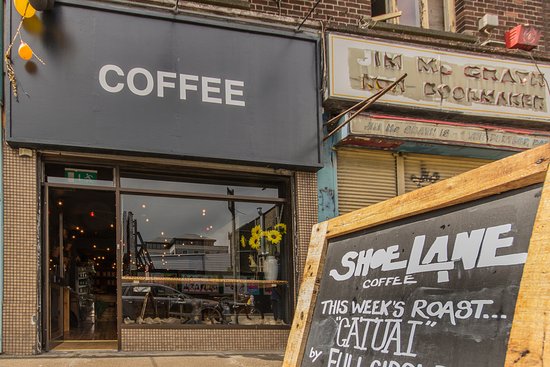
While one might not expect to hear the words a “boozy love letter of a film to a reviled vegetable” uttered at 8pm on a Friday morning, motion designer Cian McKenna’s description of his latest animated short, starring sprouts, sums up the latest laid-back, humorous yet insightful instalment of Above the Fold’s Coffee Culture talk series.
Along with McKenna, production designer Jill Beecher and writer and director Dave Tynan offered their thoughts. In combining three creators with such diverse portfolios, Coffee Culture succeeded in providing a well-rounded snapshot and insight into the series’s fourth topic – film. Previous instalments have focused on architecture, illustration and resilience. The concept is simple. Every month, a different creative discipline or theme is chosen and curated, and leading Irish creators in the field speak at a speciality cafe with plenty of drip-coffee flowing. Each venue is chosen for its commendation on the Dublin City Coffee Map, created by First Draft Coffee. The aim is to provide a healthy serving of inspiration, insight and caffeine before the hustle and bustle of the day gets underway.
In that endeavour they certainly succeeded. The insights provided by each speaker and their informal, open delivery kept me riveted for the full hour and a half. Although technical difficulties with the electronic presentations interrupted the talk on numerous occasions, the speakers were so knowledgeable and passionate about their respective fields that it didn’t prove to be too much of an inconvenience. However, such problems need to be ironed out before the next instalment to justify that €10 ticket cost.
The First Draft Coffee cafe, aptly situated in Filmbase’s building in Temple Bar, provided a comfortably snug setting for the roughly twenty people in attendance.
Firstly, McKenna discussed the wide variety of graphic styles he had turned his hand to in his illustrious career as a motion designer, a craft he later referred to as a “mercurial beast”. These styles ranged from film title sequences to advertising for a modern farming initiative – “The Farm Project”, led by Zooey Deschanel – to more commercial 2D branding for Three. He described the importance of the motion designer’s role to kick off a film and set the right tone throughout.
He concluded with an animated short he had created over Christmas. Cue two minutes of innumerable Brussels sprouts bouncing, pirouetting and swirling in synchronised motion to a hauntingly eerie rendition of “Ave Maria” as played on a theremin.
The unpredictable, jet-set lifestyle of so many involved in the film industry was best displayed by production designer and concept illustrator Beecher. Name-dropping is inevitable when discussing her career, such is the scope and merit of her work with credits including The Revenant, Spotlight, Mother! and Game of Thrones.
While her beginnings in the industry were humble and initially focused on photography, she got her break when she was recommended as a replacement storyboard artist for Alan Rickman’s A Little Chaos. She regaled the crowd with the story of her first meeting with Rickman at the Shelbourne Hotel. Unsure which “Alan” was being referred to by the friend who had recommended her for the post, she got a shock when faced with Rickman. Beecher called the late actor “the biggest gentlemen I’ve ever met”.
She also provided some lesser-known titbits about the industry. After being accepted into the American Art Directors Guild and having a desire to get a foothold in animation, she worked for six months on an animated children’s film titled B.O.O., which has been in production for donkey’s years.
Tynan, the last speaker, detailed the struggles of securing funding and recognition for work. Of his career in short film, the writer and director said “you do 20 to get people to pay attention to two”. He emphasised that while he is proud of all his pieces, not all his work will stick with audiences. He identified the difficulty of short films, in that they are an amateur medium but are required to be at a professional level for people to watch and engage with them.
He also noted the necessity for short films to be of one genre in order to maintain a consistent tone. This meant going as far as cutting out lines that “killed” in certain countries in order to keep audiences in the same headspace for the duration of the film. I was shocked at such cut-throat editing of what he deemed some of the best scenes he had directed for the overall benefit of the flow of the film.
The next edition of Coffee Culture will coincide with International Women’s Day, and if the quality of speakers present today is matched next month, I will be more than willing to pay the asking price.






